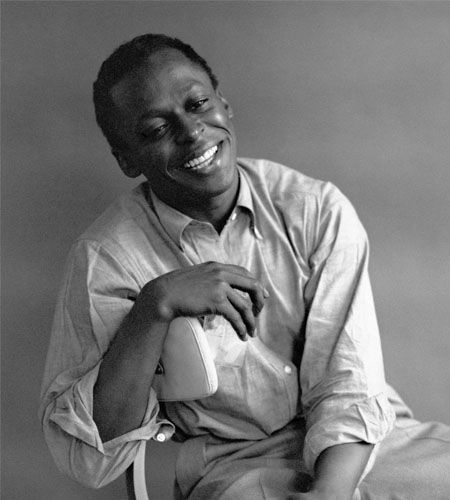Miles Davis Frases famosas
Miles Davis: Frases em inglês
“He plays like somebody is standing on his foot.”
Alternative: He plays like somebody was standing on his foot.
In Down Beat "Blindfold Test" with Leonard Feather (13 June 1964); also in
On Eric Dolphy
1960s
During an interview, after growing aggravated about questions on the subject of race.
1980s
Fonte: Jet (25 March 1985)
Robert Fripp, on how Miles Davis influenced his leadership in King Crimson.
As quoted in a Rolling Stone interview "The Crimson King Seeks a New Court" by Hank Shteamer (15 April 2019) https://www.rollingstone.com/music/music-features/robert-fripp-interview-king-crimson-tour-david-bowie-kanye-west-820783/.
Quotes by others
“Don't play what's there, play what's not there.”
In SPIN (December 1990). p. 30, and in many other sources https://www.google.com/search?tbm=bks&hl=en&q=%22play+anything+on+a+horn%22+miles+davis#hl=en&q=%22don%27t+play+what%27s+there%22+not+davis&tbm=bks, but I can't find the original one.
1990s
“For me, music and life are all about style.”
Miles, the Autobiography (1989) (co-written with Quincy Troupe, p. 398.)
1980s
“Is that what you wanted, Alfred?”
Quoted in: Jazz Journal International, (1983), p. 12.
Miles Davis asking Blue Note records producer Alfred Lion's approval of a recorded performance in Rudy Van Gelder's studio. Miles' gravelly-voice question was accidentally recorded, but included at the end of "One For Daddy-O" on the Cannonball Adderley recording "Somethin' Else": a famous recorded peek into the recording studio process.
1980s
“He could very well be the Duke Ellington of Rock 'n' Roll.”
In [A Change is Gonna Come: Music, Race & the Soul of America, Craig Hansen, Werner, University of Michigan Press, 2006, 9780472031474, 53] as: he can be the Duke Ellington of our times.
And in [Miles on Miles: Interviews and Encounters with Miles Davis, Musicians in Their Own Words Series, Paul Maher, Michael K. Dorr, Chicago Review Press, 2009, 9781556527067, 262] as: Do you know who Prince kinda reminds me of, particularly as a piano player? Duke! Yeah, he's the Duke Ellington of the eighties to my way of thinking.
On Prince
2000s
In the Jazz Review with Nat Hentoff (1958); also in , and in many other books https://www.google.com/search?tbm=bks&hl=en&q=%22play+anything+on+a+horn%22+miles+davis
On Louis Armstrong in a Playboy magazine interview.
1950s
As quoted in Jazz-Rock Fusion: The People, The Music, p. 40
1970s
As quoted in Jazz-Rock Fusion: The People, The Music (1978) by Julie Coryell and Laura Friedman, p. 40
1970s
“My ego only needs a good rhythm section.”
In [Milestones: The music and times of Miles Davis since 1960, Jack, Chambers, Beech Tree Books, 1983, 9780688046460, 261]
"My ego only needs a good rhythm section" is also the title of an interview/article by Stephen Davis for The Real Paper (21 March 1973)
On being asked what he looked for in musicians.
1970s
“A legend is an old man with a cane known for what he used to do. I'm still doing it.”
On being called a legend.
Quoted in International Herald Tribune (17 July 1991); also in: [The Yale Book of Quotations, Fred R., Shapiro, Yale University Press, 2006, 9780300107982, 189]
1990s
“I’ll play it and tell you what it is later.”
In [So What: The Life of Miles Davis, John, Szwed, Random House, 2012, 9781448106462], and in many other books https://www.google.com/search?tbm=bks&hl=en&q=%22play+anything+on+a+horn%22+miles+davis#hl=en&q=%22+and+tell+you+what+it+is+later.+%22+miles+davis&tbm=bks
Sometimes rendered as: I'll play it first and tell you what it is later.
During a recording session for Prestige, on the album "Relaxin' with the Miles Davis Quintet" (1956).
1950s
Bill Evans, on about Miles Davis's change of style to jazz fusion.
http://jazztimes.com/articles/20128-miles-davis-and-bill-evans-miles-and-bill-in-black-white.
Quotes by others
As quoted in Jazz-Rock Fusion: The People, The Music, p. 40
1970s
“I've changed music four or five times. What have you done of any importance other than be white?”
Miles, the Autobiography (1989) (co-written with Quincy Troupe, p. 371.)
At a White House reception in honor of Ray Charles 1987, this was his reply to a society lady seated next to him who had asked what he had done to be invited.
1980s
In Playboy to Alex Haley (1962); also in [Milestones: The music and times of Miles Davis since 1960, Jack, Chambers, Beech Tree Books, 1983, 9780688046460, 209], [The Playboy Interviews, Alex, Haley, Murray, Fisher, Ballantine, 1993, 9780345383006, 15], [The Miles Davis companion: four decades of commentary, Gary, Carner, Gary, Carner, Schirmer Books, 1996, 9780028646121, 19], and in [Miles Davis and American Culture, Missouri Historical Society Press Series, Gerald Lyn, Early, Missouri History Museum, 2001, 9781883982386, 205]
1960s
About the new modal style. Interviewed by The Jazz Review, 1958; Quotes in Paul Maher, Michael K. Dorr (2009) Miles on Miles: Interviews and Encounters with Miles Davis, p. 18.
1950s
